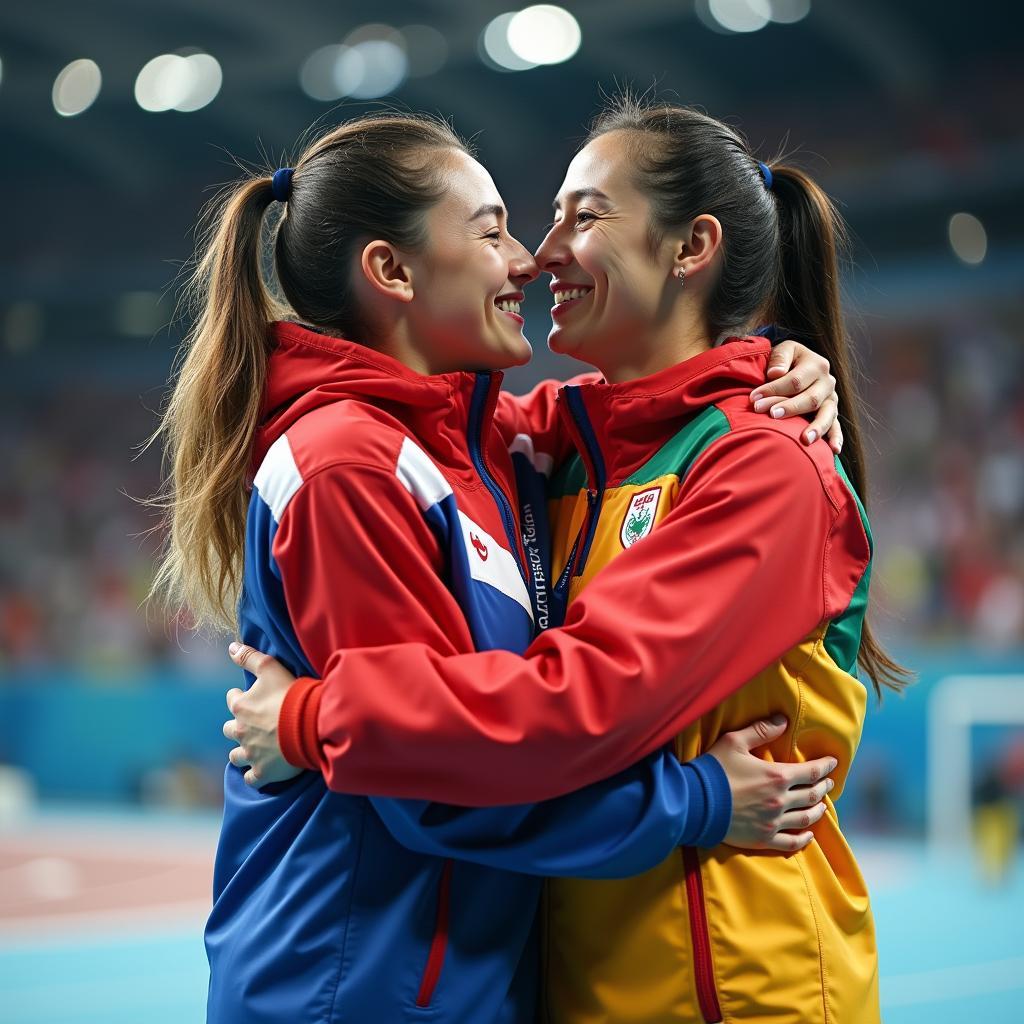Sports diplomacy and international relations through athletic events have been recurring themes in IELTS Writing Task 2, appearing approximately 2-3 times annually. Based on analysis of past exams and current global trends, this topic is likely to continue featuring prominently in future tests.
Let’s examine one common question format that has appeared in recent IELTS exams:
Some people believe that international sporting events help to improve relationships between countries. Others think these events lead to increased tensions between nations. Discuss both views and give your own opinion.
Analysis of the Question
This question requires candidates to:
- Discuss positive and negative aspects of international sports on diplomatic relations
- Present balanced arguments for both perspectives
- Provide a clear personal stance supported by relevant examples

Band 9 Sample Essay
Throughout history, the role of international sports in promoting global unity has been significant, though opinions differ on whether such events foster cooperation or create friction between nations. While international sporting competitions can occasionally intensify rivalries, I firmly believe their overall impact on diplomatic relations is overwhelmingly positive.
The positive influence of international sports on cross-border relationships is evident in several ways. Firstly, these events create platforms for cultural exchange and mutual understanding. When athletes from different countries compete together, they share experiences, traditions, and values, leading to greater appreciation of diverse cultures. The Olympic Games exemplify this, where how sports events promote cultural exchange is clearly demonstrated through opening ceremonies, athlete villages, and joint celebrations. Additionally, sporting events often necessitate diplomatic cooperation between host and participating nations, fostering dialogue and collaboration beyond the sporting arena.
However, critics argue that international sports can exacerbate tensions between nations. High-stakes competitions sometimes lead to nationalist fervor and political confrontations. Historical examples include boycotts of major sporting events and instances where athletic rivalry has sparked diplomatic incidents. Moreover, controversial decisions in matches can inflame existing political tensions between competing nations.
Nevertheless, I contend that the unifying power of sports substantially outweighs these potential drawbacks. Sports diplomacy has repeatedly proven effective in bridging political divides. The “ping-pong diplomacy” between the United States and China in the 1970s exemplifies how how sports can foster international cooperation. Furthermore, international sporting events often generate economic cooperation, tourism, and cultural programs that strengthen bonds between nations.
In conclusion, while international sporting events may occasionally generate temporary tensions, their role in fostering global understanding and cooperation is invaluable. The shared experience of competition, combined with the values of fair play and mutual respect, creates lasting bridges between nations that transcend political differences.
Band 7 Sample Essay
In today’s globalized world, international sporting events play a significant role in shaping relationships between countries. While some people view these events as catalysts for improved international relations, others see them as sources of conflict. This essay will examine both perspectives.
International sports can positively impact diplomatic relations in several ways. When countries participate in global tournaments, their athletes and citizens interact with people from different cultures, promoting understanding and friendship. For example, during the FIFA World Cup, fans from various nations celebrate together, breaking down cultural barriers. Additionally, hosting international sporting events requires countries to cooperate on security, logistics, and cultural programs.
However, these events can also create tensions between nations. Sometimes, intense competition leads to conflicts, especially when matches involve countries with historical disagreements. Furthermore, controversial refereeing decisions or accusations of cheating can strain diplomatic relations. Political protests during sporting events may also cause diplomatic friction.
In my opinion, the benefits of international sporting events outweigh their potential drawbacks. These competitions provide unique opportunities for peaceful interaction between nations and help build lasting relationships through shared experiences. While temporary tensions may arise, the overall impact on international relations remains positive.
Key Vocabulary
- diplomatic relations (n) /ˌdɪpləˈmætɪk rɪˈleɪʃənz/ – official relationships between countries
- catalyst (n) /ˈkætəlɪst/ – something that causes activity between two or more persons or forces
- exacerbate (v) /ɪɡˈzæsəbeɪt/ – to make something worse
- nationalist fervor (n) /ˈnæʃənəlɪst ˈfiːvə/ – intense patriotic feeling or enthusiasm
- transcend (v) /trænˈsend/ – to go beyond normal limits
- bilateral (adj) /baɪˈlætərəl/ – involving two parties or countries
- cultural exchange (n) /ˈkʌltʃərəl ɪksˈtʃeɪndʒ/ – sharing of traditions between different cultures
Predicted Future Topics
- The economic impact of hosting international sporting events
- Sports as a tool for peace-building in conflict zones
- The role of social media in international sports diplomacy
- Environmental sustainability in global sporting events
Practice writing your own essay on this topic and share it in the comments for feedback. Remember to structure your response clearly and support your arguments with relevant examples.